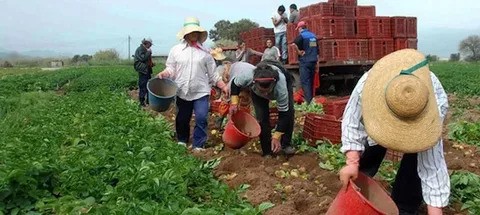Greece Farm Jobs
Greece’s sun-drenched landscapes, fertile plains, and terraced olive groves have sustained agriculture for millennia. Today, farming remains a cornerstone of the economy, employing 11% of the workforce and contributing €5 billion annually to GDP. From family-owned vineyards in Nemea to industrial-scale greenhouses in Thessaly, farm jobs in Greece offer a blend of tradition and modernity. This article explores the opportunities, challenges, and realities of agricultural work in Greece, providing insights for locals, migrants, and adventurers drawn to rural life.
The Agricultural Landscape: Greece’s Farming Sector
Greece’s diverse geography—mountainous terrain, coastal plains, and island microclimates—supports a wide range of crops. Key agricultural exports include olives, citrus fruits, cotton, and dairy. However, the sector faces challenges: rural depopulation, climate change, and reliance on seasonal labor.
Key Statistics:
- 400,000+ farms operate in Greece, 80% of which are small-scale (<5 hectares).
- Olive oil accounts for 20% of agricultural exports, with Crete producing 30% of the national output.
- Migrant labor: Over 50% of seasonal farmworkers are migrants, primarily from Albania, Pakistan, and Bangladesh.
Post-2010 debt crisis, EU subsidies (via the Common Agricultural Policy) and a growing organic farming movement have revitalized rural economies. Meanwhile, agritourism and sustainable practices are reshaping perceptions of farm work.
Types of Farm Jobs in Greece
Agricultural roles vary by region, crop, and season:
- Seasonal Harvesting:
- Olives (October–January): Pickers in Peloponnese and Lesvos earn €25–€40 daily.
- Citrus fruits (November–April): Orange and lemon harvesters in Argolis and Crete.
- Cotton (September–November): Industrial picking in Thessaly, Greece’s “breadbasket.”
- Livestock Farming:
- Shepherds in mountainous Epirus and Thessaly tend sheep and goats for cheese (feta, kefalotyri).
- Dairy workers manage milking and processing in cooperatives.
- Viticulture:
- Vineyard laborers in Naoussa and Santorini prune, harvest, and bottle Greece’s renowned wines (Assyrtiko, Xinomavro).
- Agritourism:
- Guesthouse hosts, tour guides, and workshop leaders on organic farms (e.g., Pelion’s eco-retreats).
- Specialized Roles:
- Beekeepers in Thasos produce thyme honey.
- Organic certification inspectors for EU-compliant farms.
Requirements for Farm Jobs
1. Legal Status:
- EU citizens can work freely. Non-EU migrants often secure seasonal visas through employer sponsorship.
- Undocumented workers risk exploitation; Greece’s 2021 labor law aims to formalize informal employment.
2. Skills & Experience:
- Physical stamina: Long hours (6 AM–6 PM) in extreme heat or cold.
- Basic Greek: Essential for communication with supervisors and locals.
- Specialized knowledge: Tractor operation, irrigation systems, or organic practices.
3. Certifications:
- Training in pesticide handling (for EU-regulated farms) or biodynamic farming methods.
4. Accommodation:
- Seasonal workers often live in on-site housing (basic dormitories) or nearby villages.
Earnings and Working Conditions
Pay structures depend on the job type:
| Position | Daily Earnings (EUR) | Payment Model |
|---|---|---|
| Olive Picker | €25–€40 | Piece-rate (per tree) |
| Dairy Farmhand | €35–€50 | Monthly salary |
| Vineyard Laborer | €30–€45 | Hourly wage |
| Agritourism Guide | €50–€70 | Fixed seasonal contract |
Benefits:
- Housing: Provided on remote farms.
- Meals: Often included in livestock and agritourism roles.
- Social Security: Formal contracts (συμβόλαια) include contributions, but many small farms still operate informally.
Challenges:
- Wage Delays: Common in small family farms struggling with liquidity.
- Safety Risks: Exposure to pesticides, machinery accidents, and lack of protective gear.
The Role of Migrant Workers
Migrants form the backbone of Greece’s seasonal labor force:
- Albanians: Dominant in northern Greece’s orchards.
- South Asians: Concentrated in greenhouse farms in Crete and Peloponnese.
- Undocumented Workers: Vulnerable to underpayment (as low as €15/day) and poor conditions.
NGOs like SolidarityNow advocate for labor rights, while the Greek Ombudsman investigates wage theft cases.
Challenges in Greek Agriculture
- Climate Change:
- Water scarcity threatens Crete’s olive groves; wildfires devastate crops (e.g., 2021 Evia fires).
- Rural Depopulation:
- Youth migration to cities leaves aging farmers (average age: 55).
- EU Regulations:
- Strict organic certification processes strain small farms.
- Market Pressures:
- Competition from cheaper Spanish and Italian imports undercuts local producers.
Opportunities and Innovations
- Organic Farming:
- Greece has the EU’s highest organic farmland share (20%). Workers skilled in biodynamic methods are in demand.
- Agritourism:
- Farm stays and workshops (cheesemaking, olive oil tasting) blend tourism with agriculture.
- Tech Integration:
- Drones for crop monitoring and solar-powered irrigation systems create tech-savvy roles.
- Cooperative Models:
- Women-led cooperatives (e.g., Zagori Herb Cooperative) empower rural communities.
How to Find Farm Jobs in Greece
- Local Networks:
- Visit rural cafes or bulletin boards in towns like Kalamata (olives) or Naoussa (wine).
- Online Platforms:
- Agrotypos.gr, EU Farm Jobs, and Facebook groups like “Farm Work in Greece.”
- Recruitment Agencies:
- GAIA Epicheirin connects workers with organic farms.
- Volunteer Programs:
- WWOOF Greece offers room/board in exchange for labor on eco-farms.
Cultural Insights: Life on a Greek Farm
Greek farming is steeped in tradition:
- Panigiria (festivals) celebrate harvests with music and feasts.
- Family Ties: Small farms often employ multiple generations.
- Religion: Many farmers honor Saint Demetrius, patron of agriculture.
Foreign workers should respect hierarchical structures and embrace the slow-paced, communal lifestyle.
The Future of Farm Jobs in Greece
- EU Funding: The 2023–2027 CAP allocates €3.8 billion to modernize Greek agriculture.
- Youth Incentives: Grants for under-40 farmers (e.g., “Young Farmer” scheme).
- Climate Adaptation: Drought-resistant crops and water management projects will drive new roles.
Greece Farm Jobs
Farm jobs in Greece are not for the faint of heart. They demand backbreaking labor, resilience to weather extremes, and adaptation to rural isolation. Yet, they offer unique rewards: connection to the land, immersion in timeless traditions, and a role in sustaining Greece’s agricultural heritage. For migrants, it’s a stepping stone to stability; for locals, a link to their roots; and for idealists, a chance to champion sustainability.
As Greece navigates climate and economic challenges, its farms remain a testament to endurance—and a reminder that the future of food begins in the soil.



